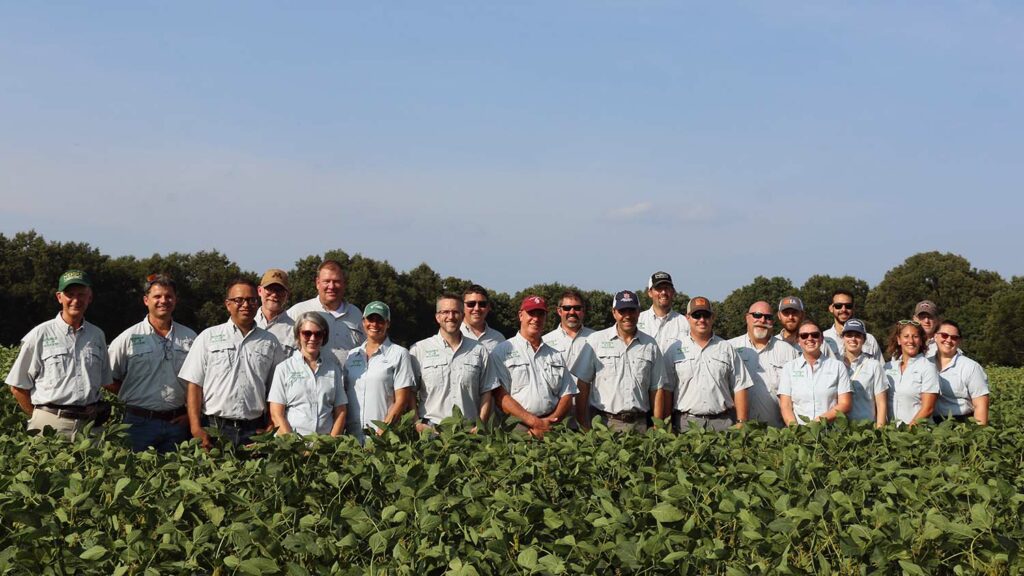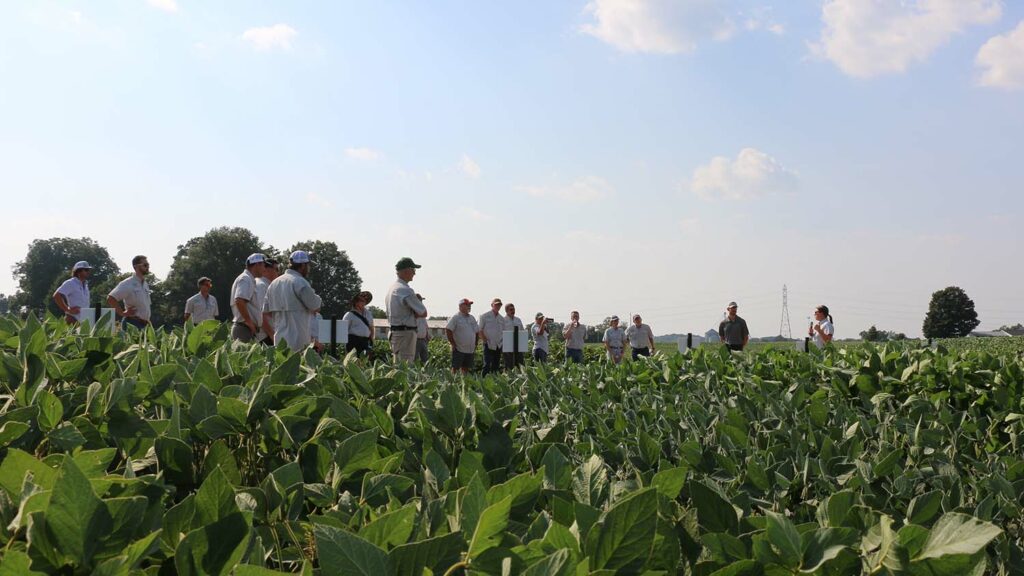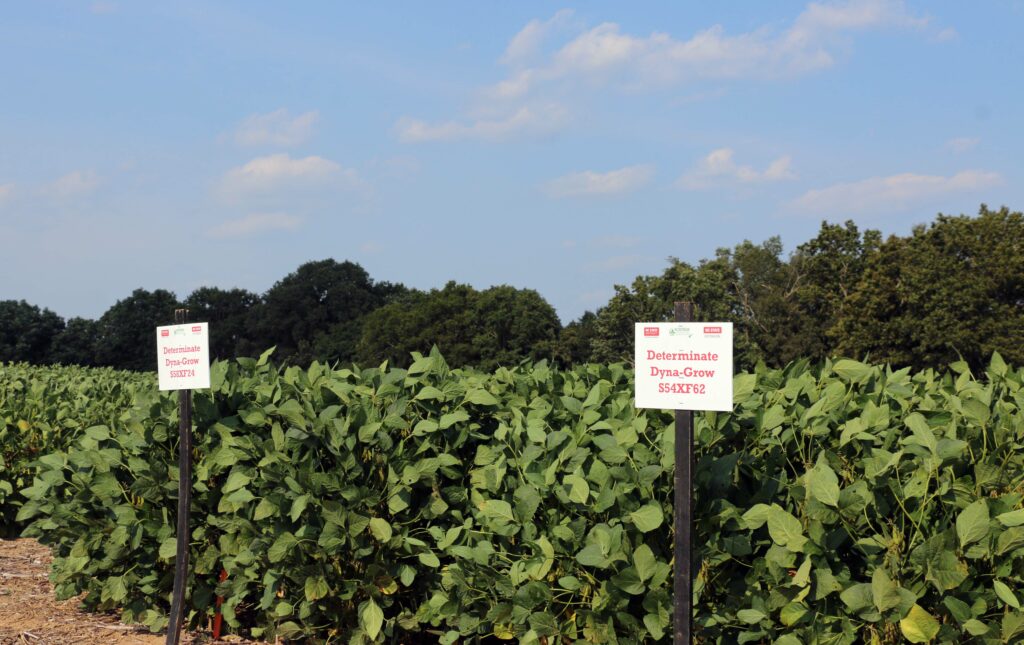National Extension Specialists Collaborate to Help Soybean Farmers
go.ncsu.edu/readext?960921
en Español / em Português
El inglés es el idioma de control de esta página. En la medida en que haya algún conflicto entre la traducción al inglés y la traducción, el inglés prevalece.
Al hacer clic en el enlace de traducción se activa un servicio de traducción gratuito para convertir la página al español. Al igual que con cualquier traducción por Internet, la conversión no es sensible al contexto y puede que no traduzca el texto en su significado original. NC State Extension no garantiza la exactitud del texto traducido. Por favor, tenga en cuenta que algunas aplicaciones y/o servicios pueden no funcionar como se espera cuando se traducen.
Português
Inglês é o idioma de controle desta página. Na medida que haja algum conflito entre o texto original em Inglês e a tradução, o Inglês prevalece.
Ao clicar no link de tradução, um serviço gratuito de tradução será ativado para converter a página para o Português. Como em qualquer tradução pela internet, a conversão não é sensivel ao contexto e pode não ocorrer a tradução para o significado orginal. O serviço de Extensão da Carolina do Norte (NC State Extension) não garante a exatidão do texto traduzido. Por favor, observe que algumas funções ou serviços podem não funcionar como esperado após a tradução.
English
English is the controlling language of this page. To the extent there is any conflict between the English text and the translation, English controls.
Clicking on the translation link activates a free translation service to convert the page to Spanish. As with any Internet translation, the conversion is not context-sensitive and may not translate the text to its original meaning. NC State Extension does not guarantee the accuracy of the translated text. Please note that some applications and/or services may not function as expected when translated.
Collapse ▲Extension soybean specialists from around the United States came to North Carolina in August to exchange ideas, evaluate research, and develop information to help growers optimize production of the important crop.
Under the auspices of Science for Success, an initiative launched by NC State Extension soybean specialist Rachel Vann and her colleagues Seth Naeve and Shawn Conley, 29 experts representing about 90% of the total soybean acreage in the U.S. held their annual meeting in Mecklenburg and Union counties.
“This is a group of 29 Extension specialists like myself that have soybean responsibilities from land-grant institutions all across the United States,” said Vann, N.C. Plant Sciences Initiative platform director for Extension, Outreach and Engagement. “We deliver best management practices to U.S. soybean farmers by collaborating on national research trials on topics that are important to farmers and summarizing research-based information for farmers using diverse outreach mechanisms. The outreach arm of Science for Success is supported by the United Soybean Board, and historically the research arm of Science for Success has been supported by local soybean boards, although we have been diversifying the funding portfolio for this work.”

Science for Success, a group of Extension soybean specialists from around the United States, visited on-farm trials in Union County.
Individually, the soybean specialists conduct research and Extension programming in their own states. The bi-annual in-person meetings and monthly virtual meetings allow for the exchange of ideas on what they are seeing in their respective areas, and facilitates discussion on how to help producers with yield, seed quality, and other issues to increase productivity and profitability.
Jenny Carleo, area specialized agent in grain crops with NC State Extension, is a part-time program manager making these efforts successful.
“This summer we’re developing educational one-pagers on a variety of soybean-related topics that are based on research-based information that we have from years of experience and shooting educational YouTube videos in the field,” Vann said. Every summer we get together in-person and have a meeting to work on this content and develop outreach strategies for the year.”
Science for Success members also conduct simultaneous research trials. With members from Florida to North Dakota, it allows them to evaluate results in a variety of soil types and growing conditions.
“We have two or three nationally coordinated projects annually,” said Laura Lindsey, soybean and small grains specialist at Ohio State University. “One that we’re working on right now is biological seed treatments. We’ll see different results because our environments are different. There’s differences you’ll pick up in the north versus south versus dry versus wet. So we can have consistent protocols, but we can have different results based on the region. Ultimately, all this effort is to help the soybean growers optimize profit.”

Science for Success members listen to NC State Extension soybean specialist Rachel Vann talk about the trials on Cameron Simpson’s farm.
These coordinated research trials also serve to educate the next generation of soybean specialists.
“We have a lot of graduate students involved in these multi-state trials,” Lindsey said. “It is an extremely valuable networking opportunity for students to have mentors across the U.S. and be exposed to diverse production systems. Those are our future agronomists either in industry, at universities, or in Extension. It’s a nice side benefit, to be training that next generation as well.”
This was the first Science for Success team meeting in North Carolina. The participants enjoyed a warmhearted welcome from Andrew Baucom, director of Extension’s Union County Center, and his staff.
“Union County has been phenomenal hosts of the group, not only in highlighting their Extension efforts, but also just going above and beyond to be hospitable,” Vann said.
The location was ideal to showcase how NC State Extension carries out its mission to help North Carolinians transform science into solutions.
“We really wanted to come to Union County so they can see how Extension functions in North Carolina, a state with an extremely strong county-level Extension presence, and how that catalyzes our ability to serve the clientele of the state,” Vann said. “We wanted them to see Extension functioning here and also engage with the farmers here about their challenges and the role Extension can play in providing solutions to those challenges.”

NC State Extension experts are conducting several soybean trials at a farm in Union County.
One of those farmers is Cameron Simpson, a third-generation grower with about 2,200 acres planted in cotton, soybeans and wheat — including soybeans that are planted specifically for research purposes. Simpson is hosting many trials for Extension in 2023.
“It’s a large on-farm trial site that both has specialist-led and agent-led research,” Vann said. “The specific Science for Success project at this site is looking at biological seed treatments and how they affect soybean yield. The unique thing about the study is that in two years we’ll have it at 100 sites across the U.S. We’re really capturing a lot of environmental variability to figure out where these products do and do not work. It’s one thing for me to tell a grower that a product didn’t work at three sites in North Carolina. It’s another thing to tell them it didn’t work at 80 sites across the U.S., including high-yielding environments in Iowa and Illinois. It amplifies my ability to answer questions with our growers and it strengthens the data set to make me more confident in making these recommendations .”
Such trials wouldn’t be possible without solid relationships between Extension specialists and area growers.
“The growers in this county have historically participated in on-farm research trials because they see it as not only a benefit to them, but also a benefit to their neighbors, who are also growers,” Baucom said. “They also see it as a way to help showcase the county as a large agricultural player in the state. There are very strong relationships historically between our growing community and the local Extension agent. Growers want to see our office succeed and do well. I think they enjoy being a part of that story.”
Morgan Menaker, Extension field crops agent in Union County and a member of the N.C. PSI Extension Network, works closely with Simpson and other farmers participating in on-farm trials.
“Growers are looking at ways they can increase profitability, whether that’s through yield, whether that’s through fertility management practices, variety selection, the list goes on and on,” Menaker said. “It also gives growers an opportunity to see different things in real time throughout the growing season that they may be interested in. And then they can take it back to their farm the following season and have more confidence in its successability rate.”
A highlight of the three-day Science for Success meeting was a visit to Simpson’s farm to view the trials and to talk with the owner about the challenges he and other soybean growers in North Carolina are facing.
The Extension professionals were able to hear Simpson detail issues that are a barrier to increased productivity, including crop loss to deer and a weed called Italian ryegrass that is proving resistant to many mitigation measures. He appreciated the opportunity to address the group, but mostly he was excited about the opportunity to hear from them.
“I can’t wait to talk to these guys and figure out what they do and what works,” he said. “Maybe they got some ideas that I can incorporate into my programs.”
Simpson knows the value of research-based solutions from hosting on-farm trials and working with Extension experts like Vann, Baucom and Menaker.
“I just consider it a pleasure and an honor to work with these individuals,” he said. “I like to have them out here so I can see what they’re doing. I learn so much when they are out here. I bug them, asking a million questions, and it really helps me to sharpen my edge.”
Allan Baucom, owner of A.L. Baucom Family Farms, is another longtime Union County grower who sees incredible value in the collective knowledge of the Extension specialists who make up Science for Success.
“Anytime you bring a group of experts from across the country, across a variety of spectrums, and all of the different areas they operate in relative to soil quality, rainfall amounts, and then you bring them together, we’ve got to glean something out of it,” he said. “There’s got to be positives that come out. There’s no way around it. These are people that want everybody to improve. They’re not looking to hold it to themselves, they’re sharing it.”
Often the information is shared through statewide associations.
“It’s a collaboration between our universities, the United Soybean Board, and our state level checkoff organizations that allow us to deliver information in more robust ways to our clientele,” Vann said.
In North Carolina, Science for Success has a very strong relationship with the North Carolina Soybean Producers Association.
“Agriculture is always driven to do a little bit better next year than you did this past year,” said Gary Hendrix, president of the N.C. Soybean Producers Association and a third-generation farmer in Hoke County. “By being able to collaborate, we can pool our resources so everybody doesn’t wind up trying to unintentionally chase the same rabbit.”
In addition to developing information to help soybean farmers, the meeting in North Carolina was beneficial in strengthening associations between some of the top specialists in the nation.
“If it wasn’t for Science or Success, I wouldn’t have these opportunities to develop personal relationships with these specialists,” Vann said. “We have close networking opportunities. The mentor aspect of it is really important, having people you can lean on to help answer questions and help you succeed professionally. Because I know them on a personal level I feel comfortable calling them about any problem or issue, and subsequently I can more robustly serve farmers in the state of North Carolina.”

